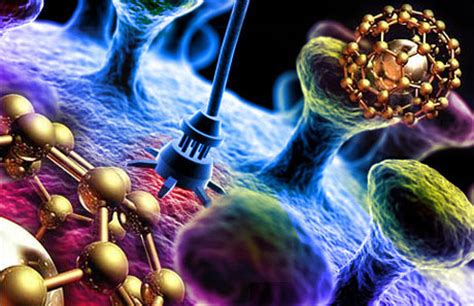Exploring the World of Nanotechnology

Discover the history, applications, and ethical considerations of nanotechnology. Explore the future of nanotechnology research in this comprehensive introduction.In today’s world, the field of nanotechnology has become increasingly prevalent and influential, impacting various industries and aspects of our daily lives. In this blog post, we will delve into the fascinating world of nanotechnology, exploring its history, applications, ethical considerations, and the future of research in this field.
Nanotechnology, which involves the manipulation of matter at the nanoscale, has gained significant attention for its potential to revolutionize medicine, electronics, environmental sustainability, and more. As we examine the history of nanotechnology, we will gain a better understanding of how this field has evolved and the breakthroughs that have shaped its development.
Furthermore, we will explore the diverse applications of nanotechnology, from targeted drug delivery systems to advanced materials and beyond. This will help us appreciate the far-reaching impact of nanotechnology in improving various aspects of our lives.
As we continue our exploration, we will also consider the ethical implications and societal concerns associated with nanotechnology. Finally, we will look ahead to the future of nanotechnology research, discussing the potential advancements and challenges that lie ahead in this dynamic and evolving field. Join us as we embark on this journey to uncover the world of nanotechnology.
Introduction to Nanotechnology
Nanotechnology is a field that involves the manipulation of matter at the atomic or molecular level. This means working with materials and structures that are incredibly small, often at a scale of 1 to 100 nanometers. At this scale, materials can exhibit unique properties and behaviors that are not seen at larger scales, leading to the development of new technologies and applications.
The concept of nanotechnology has been around for centuries, but it wasn’t until the 20th century that scientists and engineers were able to truly work at the nanoscale. The study of nanotechnology is interdisciplinary, drawing from fields such as physics, chemistry, biology, and engineering. Nanotechnology has the potential to revolutionize many industries, from electronics and medicine to environmental science and materials science.
One of the key challenges in nanotechnology is working with materials and structures that are so small and delicate. This requires advanced tools and techniques, such as scanning probe microscopes and molecular-scale assembly. Researchers in nanotechnology must also consider the ethical implications of their work, as well as the potential risks associated with manipulating matter at such a small scale.
History of Nanotechnology
Nanotechnology may seem like a modern concept, but its roots can be traced back to ancient times. The idea of manipulating matter at the atomic and molecular scale was first proposed by physicist Richard Feynman in his famous 1959 lecture titled There’s Plenty of Room at the Bottom. In this groundbreaking lecture, Feynman envisioned the possibility of manipulating individual atoms and molecules to create new materials and devices with unprecedented precision.
Despite Feynman’s visionary ideas, the term nanotechnology was not actually coined until much later. It wasn’t until 1974 that Norio Taniguchi, a professor at the Tokyo Science University, used the term to describe the precision of controlling atoms and molecules at the nanoscale. This marked the official birth of nanotechnology as a recognized field of study and research.
Throughout the latter half of the 20th century and into the 21st century, nanotechnology has rapidly evolved, with significant contributions from scientists and researchers around the world. Today, nanotechnology has made its way into numerous fields, including medicine, electronics, and materials science, and continues to hold immense promise for the future.
Applications of Nanotechnology
Applications of Nanotechnology
Applications of Nanotechnology
Nanotechnology, the manipulation of matter at the atomic and molecular scale, has a wide range of potential applications in different fields. One of the most promising areas for nanotechnology is in the field of medicine. Nanoparticles have the potential to revolutionize the way we diagnose and treat diseases. They can be used for targeted drug delivery, reducing side effects and improving the effectiveness of treatments. Nanotechnology also has applications in the development of new medical imaging techniques, such as nanoparticle-based contrast agents for improved resolution and sensitivity in imaging technologies like MRI and PET scans.
Another area where nanotechnology has the potential to make a significant impact is in the development of advanced materials. Nanoparticles can be used to create lightweight and durable materials for use in aerospace and automotive industries. They can also be used to create self-cleaning surfaces and smart coatings with properties such as UV protection and scratch resistance. Additionally, nanotechnology has the potential to improve the efficiency of energy storage and conversion devices, such as batteries and solar cells, by enhancing their performance and reducing costs.
Furthermore, nanotechnology has applications in electronics and computing. Nanoscale materials and devices can be used to create smaller and more powerful computer chips, memory devices, and nanosensors. These advancements have the potential to greatly increase the speed and capabilities of electronic devices, leading to the development of more efficient and compact consumer electronics, as well as advancements in areas such as artificial intelligence and quantum computing.
Ethical Considerations in Nanotechnology
Exploring the World of Nanotechnology – Ethical Considerations
Nanotechnology, the manipulation of matter on an atomic and molecular scale, has the potential to revolutionize various fields including medicine, electronics, and energy production. However, as with any emerging technology, there are ethical considerations that must be carefully addressed to ensure the responsible and ethical development of nanotechnology.
One of the primary ethical concerns surrounding nanotechnology is the potential environmental impact of nanomaterials. As nanotechnology continues to advance, there is a growing concern about the potential release of engineered nanoparticles into the environment and the long-term consequences of such releases on ecosystems and human health.
Another ethical consideration in nanotechnology is the potential social and economic implications of the technology. There is a risk that the benefits of nanotechnology may not be equitably distributed, leading to further social and economic disparities. Furthermore, the development and use of nanotechnology raise questions about access to the technology and the potential for exploitation of vulnerable communities.
Future of Nanotechnology Research
As we look towards the future, the field of nanotechnology holds immense promise for groundbreaking discoveries and innovations. With ongoing research and development, the potential applications of nanotechnology are boundless. Scientists and researchers are continuously exploring new avenues for utilizing nanomaterials in various industries, from healthcare to electronics.
One of the key areas of focus in the future of nanotechnology research is the development of advanced drug delivery systems. By leveraging the unique properties of nanoparticles, scientists are working towards creating targeted and efficient drug delivery methods, which could revolutionize the treatment of diseases such as cancer and diabetes.
Additionally, the future of nanotechnology research encompasses the potential for significant advancements in the field of renewable energy. Nanotechnology has the potential to enhance the efficiency of solar cells and fuel cells, leading to more sustainable and environmentally-friendly energy sources. This could ultimately contribute to addressing the global energy crisis and reducing our reliance on fossil fuels.





